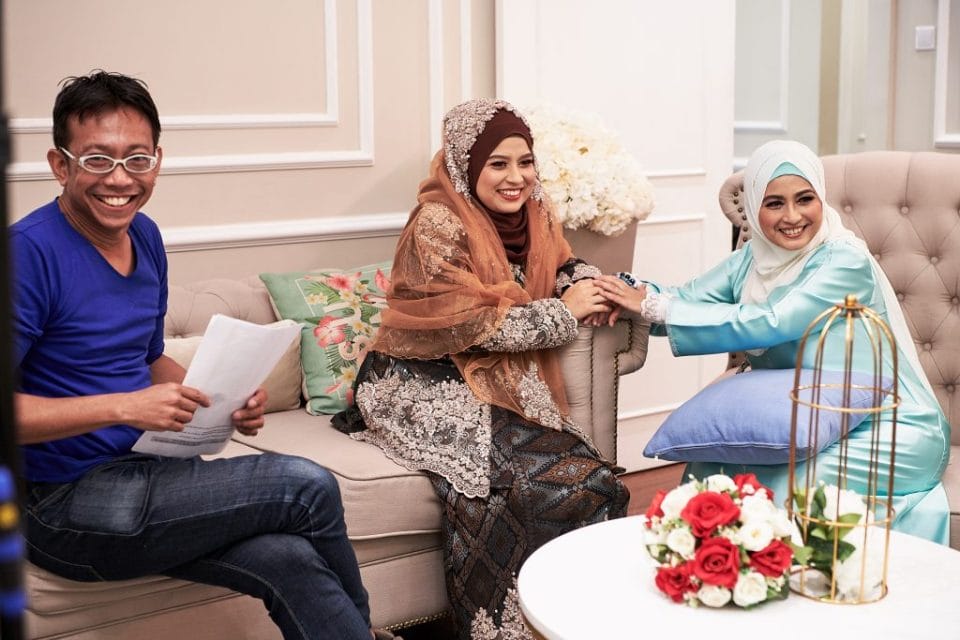
I find film making gleefully exciting, but absolutely nerve-wracking at the same time. Ho Pak Kin (co-founder of Studio59 Concepts) and I challenge ourselves to create local-centric content that everyone loves to watch, but nobody dares to make. With Malay content, there are so many subject matters that have yet to be explored and showcased, which can be universally accepted and appreciated.
I’ve directed two movies under Studio59 Concepts, Konpaku (2019) and Not My Mother’s Baking (2020). Both movies were really out of my comfort zone, with their provocative contents and storylines.
Konpaku is about a Malay man falling in love with a sensual Japanese lady, who turns out to be a succubus. With Konpaku, we explored the value of religion and sexuality within a Malay family. That already raised a lot of eyebrows. I was filled with anxiety when we sent it to the Singapore Film Censorship Board to get the film classification. I thought it would get an R21 rating, or even banned! But three weeks later, it was rated NC16, passed clean without cuts. I felt relieved, and then sorely indignant. All that sleepless nights for an NC16 rating? I should have done more!
—
Not My Mother’s Baking is about a Malay-Muslim woman falling in love with the son of roast pork sellers. With this movie, we became much more confident and bolder to push the boundaries even further, touching on hot topics of race, language and religion. I think we did it justice this time, as it took the board three months to give us the NC16 rating.
But how far can we push, before we get a backlash from the Malay-Muslim community? How much is too much? I must emphasise that our movies are provocative not for the sake of being provocative. We’re fully aware of what we’re in for. We strive to be respectful about the the movie’s subject matter and take responsibility for everyone involved.
My background is creating local TV content, so I’ll comment about traditional Malay content in that area. It seems like traditional Malay content on TV is still too jealously guarded by the gatekeepers to cater to the core demographics – the conservative viewers. We have to adhere to making programmes that are in line with community, culture and religion; nothing too provocative so there won’t be any complaints from the public.
—
I personally want to address something alarming that is happening among creators of traditional Malay content. Right from the start, we tend to already practice self-censorship ourselves, as we are hardwired to avoid getting flagged by the TV network. It’s admittedly easier to fall back into safe territory, to get the deal.
I think the TV network has a lot of catching up to do to break the tired cycle of traditional content that we always fall back on. Walk the talk, maybe, since they keep asking for fresh ideas and style?
For example, we were once invited to present our proposal for a science-fiction drama series, that was inspired by the critically-acclaimed series Black Mirror. Titled Korupsi Realiti (Corrupted Reality), we wanted to explore how technology can impact on the Malay community’s culture and religion, with cyborgs and AI-created version of Heaven. A panelist actually commented that the core audience would not be interested in drama based on technology, while ironically looking at her handphone and laptop all the time! How do we argue with that? Why invite us down to present in the first place?
—
I must confess I haven’t been following mainstream media. Netflix is so liberating!
I don’t recall seeing any Malay actors spearheading a non-Malay show on mainstream media. Malays seem to be the supporting cast material, always playing second fiddle to a Chinese main character. The Malay people all seem to just blend into the background.
Before opening Studio59 Concepts in 2012, I have done years of freelancing as a director, editor and scriptwriter, in that order of preference. I was involved in Malay and English programmes for TV, ranging from dramas to infotainment. I was a Trailer Producer with Mediacorp Channel 5 in early 2000s. One memorable project was making trailers for the very first Singapore Idol (when Taufik Batisah won). That was fun! Another was directing and editing the PCK Sar-vivor Rap music video, in 2003. Yes, guilty.
With Studio59 Concepts, I have to be more than just a director, scriptwriter and editor. I’m now also wearing the producer hat. My partner Pak Kin is truly wonderful. We agree that we’ll only propose and create works that we’re personally excited about and passionate for. I’m no longer so pressured to churn out proposals in the hope that one can get picked up. And that’s liberating for me.
One milestone was definitely the International Premiere of our movie, Konpaku, at the Udine Far East Film Festival in 2019. The movie was conceptualised in mid-2011, but production only started in late 2015. It took me another three years to complete the post-production.
We had a priceless experience at the festival. It opened up my eyes and heart that everything is possible. For that, I’m forever grateful to the festival organisers and also Philip Cheah, who championed our movie.
I also learned about more about myself in the process, what’s been keeping me back time and again. It’s my own self-doubt. Through Konpaku milestone, I even got to name my self-doubt monster, RifRaf. Heh heh.
—
Another milestone is the commercial screenings of Not My Mother’s Baking, exclusively at Filmgarde Cineplexes. We’re into our 8th week of screenings now. I’m personally proud that our movie has managed to entice senior Malays – those who have not stepped into the cinema halls in years – to go down and watch it!
I’m still a newbie in the filmmaking world, and there’s a huge learning curve. I suppose I’m judged by my 20 years of experience in the TV industry, by my peers. It’s really a different game, with different rules and players.
View this post on Instagram
I’m learning hands-on, and our ways of working things out may not be proper. There’s still a lot for me to catch up! There’s this creeping fear that I’m getting too old and my ideas, outdated and no longer relevant. That’s RifRaf talking.
I personally don’t think Malay actors have really evolved much over the years. It’s not their fault though! I just don’t feel there’s much opportunity for them to work on something that are challenging enough or groundbreaking.
Acting is considered a work of passion, and a majority from the pool of talents does it on the side. Only a handful of Malay actors can make ends meet acting full time.
One thing that hasn’t changed, is this prevalent mindset that a Malay actor can only be successful if they get to break into the Malaysian TV and/ or the film industry there. I find this to be very disheartening. I once got into a discussion with a fellow filmmaker, who insisted that we should all focus on getting our works done in Malaysia to make a name for ourselves. I personally feel we Singaporean actors and filmmakers should start on the homeground, no matter how tough it is, no matter how bad.
—
Not My Mother’s Baking first started when I fell in love – professionally – with Chef Siti Mastura. We had approached her for a webisode series and she charmed us with her charisma and elegance. She introduced us to her daughter Sarah, and I fell in love – professionally – with her too! Sarah is definitely more free-spirited.
View this post on Instagram
I found their dynamics as a mother and daughter very intriguing. Chef Siti didn’t get to spend much time with Sarah when she was growing up, because Chef Siti was too busy with her career. Naturally, Sarah blamed her mother’s career choice. But Sarah eventually became a pastry chef herself! I wanted to capture their backstory.
Furthermore, the mother and daughter shared that they they were getting less media exposure when they started wearing hijab. I felt pretty indignant about that. Shouldn’t they be judged according to their talents, and not by what they wear?
So, we weaved their story into the movie. It was initially a simpler storyline, focusing on the relationship between mother and daughter, with a budding interracial romance on the side. But Pak Kin wanted more! He upped the stakes when he wanted Sarah’s love interest to be the son of roast pork sellers. I was terrified at first, but decided to embrace it. I’m so glad I did!
Not My Mother’s Baking became much naughtier and more daring than I imagined. The movie was mostly ad-libbing and improvisations with the cast on set, so the story was very organic. We didn’t want to waste time to defend our content if we wanted to tap into conventional funding. So, we decided to fund it ourselves.
I sold my HDB house, while Pak Kin sold his Australian share portfolio. It was a huge risk for us, considering that our previous movie Konpaku has yet to make money.
Thankfully, Chef Siti had a lot of contacts for in-kind sponsors, like location at SSA Culinary Institute and the major wedding scene at Lagun Sari. That greatly helped us.
In Singapore, a Malay is automatically stamped as Muslim. What is intriguing to me, is that a lot of Malays cannot accept that there are different levels of Muslims around. There’s this puritan desire to showcase only the good side, but hide the non-flattering side. We have a character, Matin, who is obviously Malay from the colour of his skin, but likes to eat pork. That is such a huge no-no to many Malay viewers. I was personally approached by many who wanted to voice their concerns. Actually, I was very touched that they were really worried for me, and wanted to prepare me for potential backlash. I was even advised to cut some of his scenes, to minimise the impact.
—
As the director, I would only do what I could personally speak up for and defend. We made a conscious effort to protect the well-being of Al Hafiz Sanusi, who played Matin. We didn’t show that he was eating pork on screen. It was just his words!
Speaking of words, we pushed our luck in liberally using ‘babi’ in our movie, plus in our promotional materials. We are fully aware of the sensitivities surrounding its reference. A Malaysian director of Chinese descent, Namewee, is in trouble because his movie, ‘Babi’. A Chinese man got jailed recently when he called a Malay woman ‘babi’. So, when is usage of ‘babi’ offensive, and when is it acceptable? I’m so happy when a Malay journalist was inspired to write an article about the word usage, after watching our movie.
View this post on Instagram
We inserted lots of references for discussion regarding religion throughout the movie, including halal dating. When Sarah is dating Imran, the perfect Muslim man, her best friend Maya (who is also Imran’s sister) is always around to accompany them. How do Muslims date now? Is it really alright for a Hijabi single woman to be out on a date alone with a single Malay man? Everyone I know seems to close an eye about this 😉
Another is about the conversion scene at the Muslim Converts Association of Singapore. For the first time in the world, we showcased an Ustazah leading the conversion to Islam process with our lead, Edwin. Normally, an Ustaz would lead the conversion process. But there was a certain discomfort when we showed Kaydash, who played Edwin, reciting the Shahadah, the first pillar of Islam. Could an actor recite that, without consequences? Wouldn’t he turn Muslim then? Questions about religion are likely to be swept under the carpet, for fear of being branded as ignorant.
I think Malays are now portrayed more positively (albeit boringly) by non-Malay content creators. However, I definitely sit up when a non-Malay filmmaker makes a movie that is mainly in Malay, featuring Malay cast.
‘Apprentice’ by Boo Junfeng is certainly commendable! I liked the storyline, with great acting from the three leads Firdaus Rahman, Wan Hanafi Su and Mastura Ahmad. That was inspiring, to say the least.
“Revenge of the Pontianak’, directed by Glen Goei and Gavin Yap, filled me with professional jealousy. I would have loved to direct a horror movie with such amazing cast and set, at that scale!
—
Right from the start, the cast and crew expressed their concerns about certain matters and scenes.
Our producer, Bella Julita, got paranoid when we were shooting at the roast pork stall. She wondered if we could replace the roast pork with styrofoam ones! Also, she wanted to cover the shooting area with newspaper to avoid any splashes from the pork juices. We stopped her, as we were at a public area after all!
Veteran actor Vincent Tee took on his role as Mr Tan and the narrator, with relish. However, even he was unsure over some dialogue that we improvised on set, fearing that he would offend his fellow Malay actors. I assured him to just go with it. After the shoot was complete, Vincent was still worried that the movie would be banned!
Such were the race-related issues that we handled throughout the movie, from pre-production to post-production. The whole cast and crew were actually very jubilant when we got the NC16 rating, passed clean without any cuts.
Personally, I was caught off guard about a race-related issue when the movie was released commercially. We had at least three movie reviewers who questioned why I had Mr Tan as the narrrator, in Mandarin voice-over. They reasoned it was awkward because I’m a Malay director. Do I have to do everything in Malay because I’m Malay? Heh heh. Besides, having the movie with Tan’s voice gave me ample opportunities to provide a non-Muslim’s perspective of the Malay-Muslim world.
—
Yes, it’s a dream to prove that Malays can be leads and speak English on the big screen. It’s not a main motivation though. A Malay fellow filmmaker actually asked me why I got the Malay cast to speak English. My answer was simply because the particular Malay cast we had were all comfortable expressing themselves in English. My style of directing is to work with the cast with ad-libbing and improvisations on set. If they were more comfortable in Malay, I would have gone with it too.
I just don’t feel anything wrong showcasing Malays speaking English. It doesn’t mean that we’re ashamed of our own language. But yes, I’m proud that we’re the first to feature an English-speaking Malay family as leads!
The future of SG cinema? I’m not sure, really. Right now, I’m feeling blessed that we can still go to the movies despite the COVID-19 environment. I know there are lots of Singapore movie titles that are put on hold. I really hope the filmmakers can get to see their works on the big screen soon!
Our movies, Konpaku and Not My Mother’s Baking have their flaws. We are aware of that. I hope that everyone in the local film industry gets to be more supportive with one another’s works. One film’s success does not have to depend on another film’s failure.
I’m enjoying the journey and taking each step as a learning experience. It’s also time for me to get out of my comfort zone. I normally shun from interviews as I rather have my works speak for themselves, but hey, I’m learning to embrace and appreciate the opportunity to share! I think this does help further my growth as a filmmaker, and I can’t thank you enough!
This story about Remi M Sali of Studio59 Concepts first appeared in the March 2021 issue of Men’s Folio Singapore.







